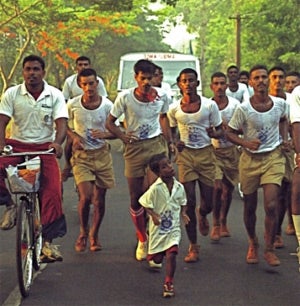TV Review: Kidult: Marathon Boy/BBC4<br/>The Secret World of Whitehall/BBC4

Gemma Atwal's film Marathon Boy (screened in BBC4's Kidult series) interleaved its narrative with shadow puppet animations – a flicker of simple two-dimensional shapes in which there was never any doubt about the differences between hero and villain, victim and monster. The documentary footage that surrounded these sequences, by contrast, was alive with uncertainty. You started watching with an easy assumption that you knew exactly what kind of film this was going to be – a study of obsession perhaps, or an anthropological curiosity. You ended having seen it twist in front of you into an entirely different kind of documentary, gripping and sad and durably ambivalent about its subjects.
Something of a marathon itself, Atwal shot the film over five years, initially attracted by the fuss surrounding a young boy called Budhia, who'd attracted a considerable following in the Indian state of Orissa. Budhia was a slum child, taken into a private orphanage run by a judo coach called Biranchi Das, a man who appeared to be driven equally by compassion and a desire to make his mark on the world. According to the official version, Biranchi Das had punished Budhia one day by making him run round the orphanage courtyard. Having forgotten to tell him to stop, he returned hours later to find the three-year-old still running. Convinced that he'd discovered an athletic prodigy, Biranchi Das began training Budhia for marathons, turning him into a mascot of local state pride and an object of quasi-religious adoration for the crowds that came out to watch him jog pass.
At which point Orissa's child welfare bureaucracy got interested and attempted to prevent Budhia from running any more marathons. Biranchi Das – not one of nature's diplomats – reacted with scorn and defiance. After learning that Budhia's mother had sold him to a street peddler for 800 rupees (around £11), he adopted him and promptly set up a record-breaking attempt to run 42 miles. Astonishingly, Budhia completed the distance, staggering over the finish line almost comatose with exhaustion. And as Biranchi Das persuaded him to run another two miles to meet local dignitaries and ventriloquised his public statements ("Say the more the police drag you down, the more you will strive to succeed," he whispered in his ear), you didn't have much doubt that someone needed to intervene.
Budhia's supporters were protesting in the streets and burning effigies of local child-welfare officers. The Orissa government, meanwhile, appeared prepared to do almost anything to assert their authority, from persuading Budhia's mother to reclaim him and take him back to the slum, to bringing a series of embezzlement charges against Biranchi Das. Budhia's celebrity was beginning to create a perception of wealth, though Biranchi Das insisted that it all went to the running of his orphanage or into a special trust. He certainly didn't look like a man who was exploiting a child for riches, even if it was clear that he'd lost sight of Budhia's best interests in a dazzle of self-regard and personal drive. When the police moved in to prevent the pair from starting a 500km marathon walk (an attempt to get round the running ban), Biranchi Das recorded a protest song with the help of local musicians, further aggravating the authorities.
Eventually – by some means that wasn't clear – Budhia's mother was persuaded to assert her right to take her son back, at which point he began making allegations of abuse against his former coach. Tellingly, while he'd never appeared distressed in Biranchi Das's care he looked visibly disturbed when making these allegations, repeatedly biting his mother and pleading to go. Then, shockingly, Biranchi Das was shot dead, in a contract killing that seemed to hint at police and state corruption. Budhia withdrew the charges of abuse, and the Orissa government gave him a scholarship of sporting excellence that now allows him to attend a private school, a gesture that it was hard not to read as penitent. The shadow puppet animation had shown a spider, reaching out to ensnare Budhia in a web and haul him back to his mother. The film showed you three dimensions, a world in which a charitable ambition could begin to look like exploitation and child welfare like a kind of abuse. Nobody came out if it well, except perhaps Budhia, who at least came out the other side.
Sir Humphrey Appleby was the figure haunting the first episode of The Secret World of Whitehall, another of Michael Cockerell's dissections of the Government machine. This time he was concentrating on one of the less conspicuous bits of cog-work – the Cabinet Secretary, whose job it is to make sure that the entire mechanism functions in reasonable synchrony, and actually travels in the direction that the Prime Minister wants it to. It is a position of considerable power and influence, though it seemed balefully significant that while early Cabinet Secretaries had served several Prime Ministers in succession, carrying their knowledge of government from one incumbent to the next, Tony Blair, who wanted to wrestle control away from the mandarins, had got through three on his own. Like Marathon Boy, this too left you a little uncertain about who was the villain and who was the hero. Civil servants, after all, don't get elected by anyone, and can be masterful at dulling the edge of political will. Then again, there are times when you'd be very grateful for someone to do some bluntening.
t.sutcliffe@independent.co.uk
Subscribe to Independent Premium to bookmark this article
Want to bookmark your favourite articles and stories to read or reference later? Start your Independent Premium subscription today.

Join our commenting forum
Join thought-provoking conversations, follow other Independent readers and see their replies